
This post is about spam. No, not the canned, precooked ‘meat’ product. I’m talking about Canada’s new Anti-Spam Legislation (CASL) – what’s been cited as one of the toughest spam laws in the world. CASL, which goes into effect July 1, 2014, requires digital marketers to get consent from recipients before sending commercial electronic messages (CEMs). The spirit of the law is to ensure privacy and protect people from unwanted email, text or other CEMs. So how does this affect you, as a digital marketer? Let’s dig in.
11 things digital marketers need to know
1.) CEMs include, but are not limited to, email marketing, text message (SMS) marketing, direct messages sent via social media networks, and website visitor tracking using cookies or software programs. 2.) The burden of proof of consent is on the sender. 3.) A CEM requesting consent and sent after July 1 will be considered spam. 4.) Governing bodies may take action against the sender for up to three years after a CEM was received without consent. 5.) There are two types of consent: express and implied. * Both types of consent must be recorded and verified. 6.) Recipients must take separate action to agree to: * Terms and conditions of commercial activity, * Receiving commercial electronic messages (electronic newsletters, promotions, etc.), * Installation of computer program (if applicable). Under no circumstances should the consent toggle box be pre-checked.  7.) Three key elements must be in all CEMs: * Purpose for which consent is sought * Clear identification of sender, including contact information * Ability to unsubscribe or withdraw consent at any time, with a mechanism such as an opt-out link within the CEM to facilitate that process. 8.) The request to opt out or unsubscribe from CEMs must be in effect no later than 10 business days after the request was made. 9.) If a business is acquired, contacts and any consent given will be inherited by the acquiring company. 10.) Businesses that purchase email addresses for commercial activities may continue to do so, provided that those email addresses are collected and compiled in a legitimate manner, compliant with CASL legislation. 11.) With provisions for extended liability, officers and directors of the business or organization sending the message are also held responsible.
7.) Three key elements must be in all CEMs: * Purpose for which consent is sought * Clear identification of sender, including contact information * Ability to unsubscribe or withdraw consent at any time, with a mechanism such as an opt-out link within the CEM to facilitate that process. 8.) The request to opt out or unsubscribe from CEMs must be in effect no later than 10 business days after the request was made. 9.) If a business is acquired, contacts and any consent given will be inherited by the acquiring company. 10.) Businesses that purchase email addresses for commercial activities may continue to do so, provided that those email addresses are collected and compiled in a legitimate manner, compliant with CASL legislation. 11.) With provisions for extended liability, officers and directors of the business or organization sending the message are also held responsible.
Next steps: What you should do to prepare
It’s important for digital marketers to start preparing now for this legislation. Here are seven things you can do to get ready: 1.) Gain express consent now for any contact who may be have given implied consent. 2.) Determine what forms of consent (express or applied) youwill need, how you will record consent, and how you will prove existing business relationships. 3.) Audit existing CEMs, templates, and online forms to ensure the prescribed elements are in place, and make any necessary updates or revisions to those assets to comply with CASL. 4.) Review your electronic communication technologies for capabilities to support CASL compliance. 5.) Review and update your privacy policy and provide an easily accessible link to this policy on your website and in CEMs. 6.) Educate employees on CASL requirements so they understand and are prepared to record consent or withdrawal of consent. 7.) Know that regulators are seeding lists to monitor and enforce CASL compliance. Assume regulators are monitoring your CEMs. 8.) Talk to your legal counsel for further information about CASL legislation and how it directly applies to your business. Taking these critical steps now will help you not only to comply with new legislation, but also avoid loss of valuable email addresses due to uncertainty of consent status. Talk to your legal counselfor further information about CASL legislation and how it directly applies to your business. Know what you need to do but not sure how to make it happen? Contact us, and we’ll be happy to help!
Additional CASL resources:
Full text of Canadian Anti-Spam Legislation CASL Questions and Answers from Industry Canada Spam identifier infographic from Government of Canada Glossary of spam terms from Government of Canada
